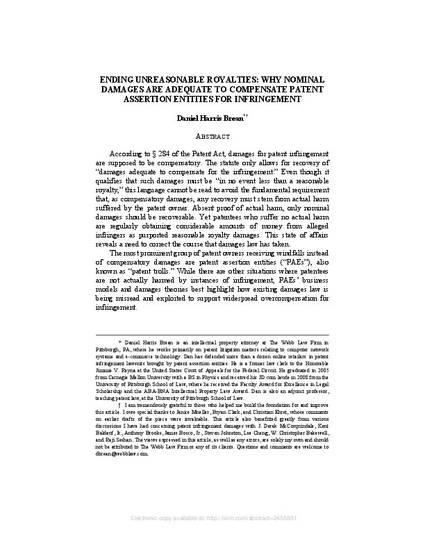
Article
Ending Unreasonable Royalties: Why Nominal Damages are Adequate to Compensate Patent Assertion Entities for Infringement
Vermont Law Journal
(2015)
Abstract
According to Section 284 of the Patent Act, damages for patent infringement are supposed to be compensatory. The statute only allows for recovery of "damages adequate to compensate for the infringement." Even though it qualifies that such damages must be "in no event less than a reasonable royalty," this language cannot be read to avoid the fundamental requirement that, as compensatory damages, any recovery must stem from actual harm suffered by the patent owner. Absent proof of actual harm, only nominal damages should be recoverable. Yet patentees who suffer no actual harm are regularly obtaining considerable amounts of money from alleged infringers as purported reasonable royalty damages. This state of affairs reveals a need to correct the course that damages law has taken.
The most prominent group of patent owners receiving windfalls instead of compensatory damages are patent assertion entities ("PAEs"), also known as "patent trolls." While there are other situations where patentees are not actually harmed by instances of infringement, PAEs' business models and damages theories best highlight how existing damages law is being misread and exploited to support widespread overcompensation for infringement.
PAEs are exclusively in the business of patent assertion, seeking to license their patents via actual or threatened litigation. They make and sell no products or services themselves, having no capacity or infrastructure to do so, nor do they partner with technology companies to develop and bring their patented products or services to market. Having no actual or prospective direct or indirect market participation relating to the technology, PAEs suffer no pecuniary loss from infringement — they are no worse off than they would be if the infringement had never occurred. PAEs are only legally harmed, not actually harmed, by infringement.
The business model of PAEs is lucrative because of the erroneous assumption that substantial reasonable royalty damages must be awarded for any infringement. The statutory language allowing for damages "in no event less than a reasonable royalty" has been twisted and expanded, especially by PAEs in recent years, far beyond its strictly compensatory origin. PAEs emphasize improper restitutional facts instead of compensatory ones to unduly inflate their supposed damages — i.e., they focus on the benefits to the infringer instead of the harm to themselves. They also draw analogies to common law trespass principles to suggest that, just as a trespass interferes with a landowner’s use of real property, substantial damages are owed to patentees merely because they own the patent and the patent was infringed. When properly examined, however, these common law principles reveal that the analogy would support only nominal damages for such legally harmful but actually harmless trespasses.
Nothing in the legislative history of the reasonable royalty statute suggests that a reasonable royalty was required to be a substantial sum. With no evidence that Congress intended a reasonable royalty to be substantial or have a special meaning, under the plain meaning of the statutory text a royalty should be deemed reasonable simply when it constitutes sensible and fair compensatory relief. This allows for case-by-case findings of actual damages without artificial legal constructs that distort the meaning of Section 284. Under this fresh reading of the statute, patent owners who suffer no actual harm from infringement would be entitled to recover nominal damages only. In some cases, such as those brought by PAEs, a nominal royalty is reasonable.
Keywords
- patent,
- infringement,
- damages,
- patent troll,
- patent assertion entity,
- reasonable royalty,
- reasonable,
- royalty,
- restitution,
- unjust enrichment,
- trespass,
- license,
- fees,
- harm
Disciplines
Publication Date
2015
Citation Information
Daniel Harris Brean. "Ending Unreasonable Royalties: Why Nominal Damages are Adequate to Compensate Patent Assertion Entities for Infringement" Vermont Law Journal (2015) Available at: http://works.bepress.com/daniel_brean/5/
